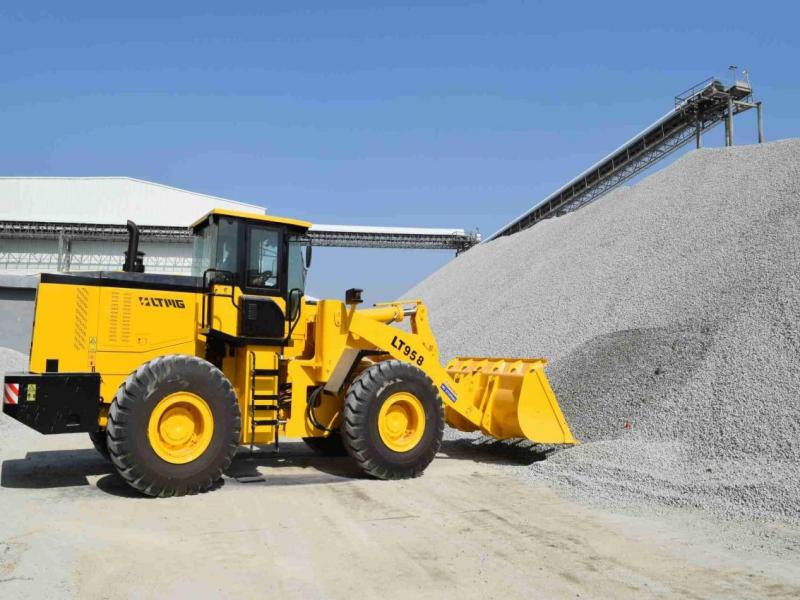How to Improve the Efficiency of Wheel Loaders
Aug 09, 2024
Wheel loaders play a crucial role in industries such as construction, mining, and agriculture. Enhancing the efficiency of wheel loaders can reduce operating costs, increase productivity, and extend the equipment's lifespan. In this article, we will explore various approaches to improving wheel loader efficiency, including operational techniques, maintenance practices, technological upgrades, and work environment optimization.
Operational Techniques
1. Skilled Operation
The skill level of the operator directly impacts the efficiency of the wheel loader. Regular training and skill enhancement can enable operators to handle the equipment more proficiently, reducing errors and improving work efficiency. Skilled operators can quickly complete loading, transferring, and unloading tasks, maximizing the potential of the equipment.
2. Planning Work Routes
Properly planning work routes can reduce unnecessary travel and waiting time, thereby improving work efficiency. Operators should plan the optimal work route in advance based on site conditions to avoid repetitive travel and unnecessary waiting. Additionally, minimizing turns and reverse operations can enhance the overall efficiency of the loader.
3. Using Appropriate Work Modes
Different work modes are suitable for various conditions. Operators should select the appropriate work mode based on actual needs to optimize the loader's performance. For example, choosing high-power mode for heavy-duty operations and energy-saving mode for light-duty tasks can save energy while ensuring work efficiency.
Maintenance Practices
1. Regular Inspection and Maintenance
Regular inspection and maintenance are fundamental to ensuring the efficient operation of wheel loaders. Operators should follow the equipment manual's guidelines, regularly inspect and replace engine oil, hydraulic oil, filters, and other consumable parts, and clean the air filter in a timely manner to maintain the engine and hydraulic system in good condition. Regular maintenance can extend equipment life, reduce failure rates, and improve work efficiency.
2. Checking Tires and Suspension System
The condition of tires and the suspension system directly affects the loader's work efficiency and safety. Operators should regularly check tire pressure, wear conditions, and suspension system connections to ensure proper tire pressure, even wear, and normal operation of the suspension system. Inadequate or excessive tire pressure can affect the stability and fuel economy of the loader, thereby reducing work efficiency.
3. Lubrication and Fastening
Lubrication and fastening are crucial aspects of equipment maintenance. Operators should regularly check the lubrication of various parts and timely add lubricating grease to ensure smooth operation of all components. Additionally, regularly inspecting the tightness of bolts, nuts, and other fasteners can prevent loosening or falling off, ensuring safe and reliable operation of the equipment.
Technological Upgrades
1. Upgrading the Hydraulic System
The hydraulic system is one of the core components of a wheel loader. Upgrading the hydraulic system can enhance the equipment's work efficiency and operational flexibility. For instance, using high-efficiency hydraulic pumps and intelligent control systems can reduce energy loss, improve the hydraulic system's response speed and control accuracy, thus increasing the loader's work efficiency.
2. Adopting Advanced Engine Technology
The engine is the power source of the loader. Adopting advanced engine technology can improve fuel efficiency, reduce emissions, and lower operating costs. For example, using high-pressure common rail injection technology, turbocharging technology, and exhaust gas recirculation technology can enhance the engine's combustion efficiency and power output, thereby improving the loader's work efficiency.
3. Applying Intelligent Control Technology
Intelligent control technology can significantly improve the work efficiency of wheel loaders. For instance, using GPS positioning and real-time monitoring systems can optimize work routes and monitor equipment status in real-time, reducing errors and downtime. Additionally, applying automation technology can reduce the operator's labor intensity, improving work efficiency and quality.
Work Environment Optimization
1. Leveling the Work Site
A leveled work site can reduce the loader's driving resistance and bumpiness, thereby improving work efficiency. Before construction, operators should level the work site, remove obstacles and debris to ensure smooth operation of the loader.
2. Proper Work Scheduling
Proper work scheduling can increase the loader's utilization rate and work efficiency. Operators should reasonably arrange work hours based on actual conditions, avoiding extreme weather conditions such as high temperatures or rain and snow, to reduce equipment wear and failure rates. Additionally, scheduling continuous work sessions can reduce the number of equipment startups and shutdowns, thereby improving work efficiency.
3. Enhancing Team Collaboration
Team collaboration is crucial for improving work efficiency. Operators should closely cooperate with personnel from other trades and positions, ensuring reasonable division of labor to ensure smooth and efficient work processes. For instance, loader operators should coordinate with excavator and truck drivers to ensure efficient loading and transferring, reducing waiting time and enhancing overall work efficiency.
Improving the efficiency of wheel loaders requires a multifaceted approach, including operational techniques, maintenance practices, technological upgrades, and work environment optimization. By enhancing the skills of operators, regularly inspecting and maintaining equipment, adopting advanced technologies, and optimizing the work environment, the work efficiency of wheel loaders can be significantly improved, reducing operating costs and extending equipment life. In practice, companies should develop scientific and reasonable management measures based on their specific conditions to comprehensively improve the operational efficiency and productivity of wheel loaders.
